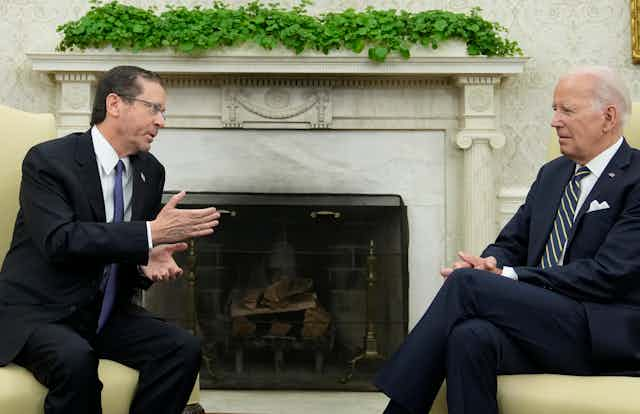During his recent trip to the United States, Israeli President Isaac Herzog gave a speech before the United States Congress. Mainstream media coverage of his speech has focused on two points: the unbreakable “sacred” bond between Israel and the U.S., and the idea that calling Israel a racist state is antisemitic.

These two points were on display recently when Congresswoman Pramila Jayapal, chair of the Congressional Progressive Caucus, called Israel a “racist state.”
After pressure from both Democrats and Republicans, who labelled her comments antisemitic, Jayapal walked back her remarks.
Further, the U.S. House of Representatives then overwhelmingly passed a resolution proclaiming that Israel is “not a racist or apartheid state” in a 412-to-9 vote.
What the coverage of these stories did not explain was why the U.S.-Israel relationship is considered unbreakable and why the charge of antisemitism is directed against those who call Israel an apartheid and racist state.
The harsh reaction to Jayapal’s comments and celebration of Herzog’s speech show that the U.S. government, whether Democrat or Republican, sees its interests as tightly aligned with Israel’s.
Regardless of which political party or coalition is in power in Israel, and regardless of where public opinion in the U.S. is moving, the U.S. government’s “commitment to Israel’s security is ironclad,” as Vice-President Kamala Harris put it.
The U.S. sees Israel as a critical “strategic ally” in the Middle East. During his recent meeting with Herzog, President Joe Biden repeated a line he famously said in 1986: “If there were not an Israel, we’d have to invent one.”
Shared values or naked self-interest?
Why would the U.S. need to invent an Israel? Biden has always seen Israel as an investment which produces the best returns for U.S. interests.
In 1986, when he was a member of the U.S. Senate Committee on Foreign Relations, he opposed the sale of weapons to Saudi Arabia because they were not able to become “agents of .U.S interests in the Persian Gulf region.”
He stressed that his opposition to the weapons sale was not about whether the Saudis were good guys or bad guys, but about the ability of the Saudis to help advance and secure U.S. interests.
He emphasized that the “naked self-interest of the U.S.” should always guide their Middle East policy, and that his support for Israel is situated within that self-interest. As he bluntly explained: “Were there not an Israel, the United States of America would have to invent an Israel to protect her interest in the region.”
Biden’s frank comments make clear that the U.S.-Israel “bond” is not about defending democracy. Rather, it has always been, and still is, about American imperial interests in the region.
So, if this bond is simply about naked self-interest, why all the fuss about whether Israel is labelled a democracy or an apartheid and racist state?
Hiding behind ‘democratic values’
Herzog and his many admirers in the U.S. Congress believe that Israel ought to be a Jewish and democratic state, meaning the majority of its population would have to be Jewish if it is to remain democratic.
The narrative the American public has been fed for decades is that the U.S. supports Israel because it is the only democracy in the Middle East. However, that narrative is increasingly difficult to support.
In addition to the decades-long illegal occupation of Palestinian land, recent judicial reforms passed by Israel’s far-right government undermine the integrity of its own legal system in relation to its Jewish citizens. Meanwhile, Palestinians have experienced firsthand for decades how arbitrary and brutal the Israeli legal system can be.
If the democratic narrative no longer holds, then the case for providing Israel with unquestioning support becomes more difficult to make to the American people.
Read more: On its 75th birthday, Israel still can't agree on what it means to be a Jewish state and a democracy
The case that Israel is a settler-colonial state that practises apartheid is well-established by scholarly experts and human rights organizations. These basic facts are difficult to refute and this is why the Israeli state uses accusations of antisemitism to silence and censor such critiques.

When you consider what the American public thinks about this issue, it becomes easier to understand why Biden and virtually all of the leading politicians in the U.S. and Israel are so afraid of the term apartheid. A recent poll by Ipsos found:
“[I]n the absence of a two-state solution to the Israeli-Palestinian conflict, about three-quarters of Americans, including 80 per cent of Democrats and 64 per cent of Republicans, would choose a democratic Israel that’s no longer Jewish, over a Jewish Israel without full citizenship and equality for non-Jews living under its authority.”
In other words, most Americans understand that the only solution to apartheid is full equality for everyone who falls under the official and unofficial sovereignty of the Israeli state, as all Palestinians currently do. The number of Palestinians between the Jordan River and the Mediterranean Sea is more or less equal to the number of Israeli Jews. Equal rights would mean the end of the Jewish state as a state for a Jewish majority.
And why is such an outcome seen as detrimental to U.S. interests by the American political class? For the same reason that Biden in 1986 did not think Saudi Arabia could become an agent of U.S. interests. Simply put, Israel would no longer be a U.S.-backed entity that serves U.S. interests against the interests of the people of the region.
Rather, a state with equal rights, which would of course include Israeli Jews, would finally become part of the region, and therefore not likely to serve U.S. naked self-interest.
When we see matters in this light, we begin to see that what these two governments fear is in fact a true democracy that is of and for all the people of Israel and Palestine. Though the U.S. political class may fear this outcome, American public opinion is beginning to shift towards it.
That shift must continue to grow and expand to the point where politicians do not have to walk back their accurate remarks about Israel being an apartheid and racist state. If not, the U.S.-Israel relationship will remain “ironclad” and Palestinians will continue to pay the price.

